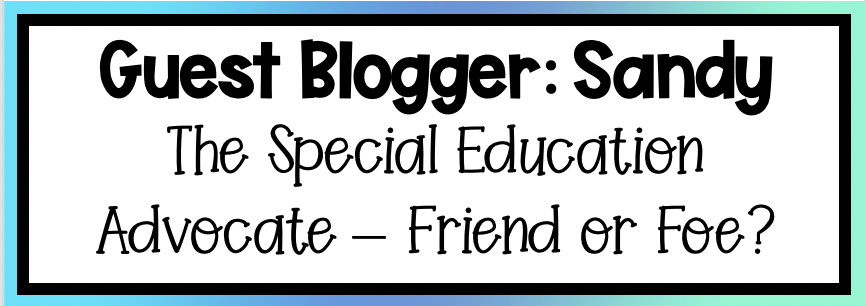Teachers, be honest, when you hear that a parent is bringing an Advocate to the IEP meeting, what is your reaction?
I am excited to introduce this week’s guest blogger, Sandy. Sandy is a Master IEP Coach®️ and Bilingual Education Advocate! You can find her website here.

Cue the groan, eye roll and face palm.
Admit it. Quite often the first reaction is one of dread. You envision contention, accusations, threats, or conversations that go around in circles leading to nowhere.
And the truth is that there are advocates who behave this way. We call them the “Angry Advocates.” The ones who come in fired up and guns blazing. But not all Advocates are built the same.
Many Advocates come to the table as a parent of a special needs child themselves. They understand their client’s emotional state. They empathize with the feelings of confusion, frustration, and the fear. It is a scary place to be.
Other advocates come to the table with a background in education or as a therapy service provider. They may see the situation from a lens of compliance. Advocates know the knowledge and understanding of what is possible, to help support the student.
As a parent of an autistic young man and a former paraprofessional, I have sat on both sides of the IEP table. I know how scared the parent is for their child’s future. Also, how frustrating it is for the school team to have added responsibilities placed on them.
The parent may not understand how their child does not meet criteria for school-based OT services while not being able to write legibly. Despite the accommodations for reduced assignments, homework STILL takes over an hour to finish.
On the other side, the teacher may have a classroom with twenty students, six with IEPs, ALL requiring data collection, and varying levels of support, in addition to their regular work. They may be frustrated that despite the extended time, shortened assignments and other accommodations, the student still refuses to do the work or does not turn in homework meanwhile the parent is blowing up the teacher’s email. I get it. It hurts when you perceive that someone is telling you that you are not doing your job to the best of your ability.
It is also true that sometimes teams fall into a comfort zone and do things on auto-pilot as it may be easier to keep going as you are rather than shake things up and try something new.
A good Advocate can see both sides clearly and help bridge the gap. To effectively support their client and work to ensure the meeting results in a well-written IEP, so that the teachers have the tools THEY need, to help support their students. Teachers go into the profession to help, not hinder students. And I am a strong believer that they deserve the resources they need to do the best for their kids.
With the proper supports in place, such as specialized equipment, clearly defined expectations of the roles of each staff member that will work with a student and added collaboration with the private therapy providers to give strategies that work best for this child, the educators will be properly outfitted to support their students.
At the end of the day, if we come to the meeting with an open mind and see the Advocate across the table as a person dedicated to helping the TEAM, we can make magic happen and prepare our kids for further education, employment, and independent living.
If you’re a teacher looking for more ways to advocate for your students, read this post!
Instagram | TeachersPayTeachers | Facebook | Boom Learning Library | Pinterest |Youtube
What are you looking for?
COPYRIGHT © 2025 Full SPED Ahead